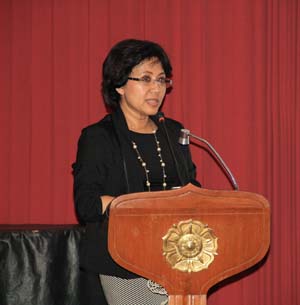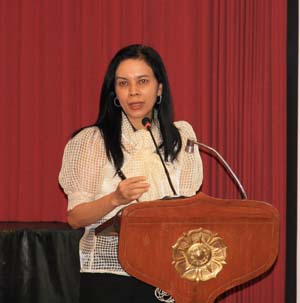Topic D:
The Impact of Doctor Migration on Medical Doctors Education
and Residency (medical specialists) Training
13 May 2014
 This session was given by representatives from Indonesia and Thailand. Health education in the future should be improved in order to support the ability of health professionals to face the challenges of an increasingly complex future. This was stated by dr . Ova Emilia , M.Med . Ed.Sp.OG ( K ) , PhD in the last session of the first day of the event Postgraduate Forum on May 13, 2014. Specified future not only of the exact path. According to dr . Ova , many ways you can do to improve the competence of health personnel, among others, not only related to education alone but also related to the real world. The first way is Practice based Learning and Improvement. These competencies to improve the ability to fix an error, use of technology in decision making, knowing the areas that must be improved to be more enhanced insight, skill, attitud, and maintenance processes.
This session was given by representatives from Indonesia and Thailand. Health education in the future should be improved in order to support the ability of health professionals to face the challenges of an increasingly complex future. This was stated by dr . Ova Emilia , M.Med . Ed.Sp.OG ( K ) , PhD in the last session of the first day of the event Postgraduate Forum on May 13, 2014. Specified future not only of the exact path. According to dr . Ova , many ways you can do to improve the competence of health personnel, among others, not only related to education alone but also related to the real world. The first way is Practice based Learning and Improvement. These competencies to improve the ability to fix an error, use of technology in decision making, knowing the areas that must be improved to be more enhanced insight, skill, attitud, and maintenance processes.
The second point is a Systems Based Practice , the goal of competence is the ability to understand, access, and resource and support system for service. Understanding the advantages and disadvantages of a system and trying to find a way out in order to improve services. Using the evidence and common purpose in the prevention, diagnosis and action . Establish good cooperation with colleague health professionals to better serve patients facing complex systems.
Additionally dr . Ova Emilia , M.Med . Ed.Sp.OG ( K ), PhD states that there is a form of training in the future must be obtained by a doctor: to develop the ability to understand the needs of the patient's physician, the clarity of duties / work area general practitioners and specialists, Continue professional development (CPD) is a requirement importantly, the achievement of broader expectations for the training phase of postgraduate ( master general abilities such as leadership, communication, orientation on quality and patient; adapt themselves to work in teams ; quality training) . Application of a new form of training will bring pressure from within and outside the educational environment. Limited resources, must bring in new teachers, need a great effort to change the old express their views is the pressure of the educational environment. External pressures include enjoy unlimited time because they have to share the work time, changes in services, the demand of safety service that is currently booming, increased productivity and great complexity of an increase in knowledge.
Wanicha Cheungkongkeuw (Thailand)
 Lack of health workers in Asia , especially Southeast Asia threatens to hamper the effectiveness of health care quality health announced by the government in each country . This was disclosed by Wanicha Chuenkongkaew . the Postgraduate Forum , WHO estimates that the ratio of physicians to population if less than 2.3 health workers per 1000 population effectiveness of health care will not be achieved. In comparison with developed countries like the U.S. which touched 12.3 Southeast Asia only touched 1.6 .
Lack of health workers in Asia , especially Southeast Asia threatens to hamper the effectiveness of health care quality health announced by the government in each country . This was disclosed by Wanicha Chuenkongkaew . the Postgraduate Forum , WHO estimates that the ratio of physicians to population if less than 2.3 health workers per 1000 population effectiveness of health care will not be achieved. In comparison with developed countries like the U.S. which touched 12.3 Southeast Asia only touched 1.6 .
The cause of the lack of health workers due to several reasons, among others: the low level of acceptance and the high cost of education, less follows a curriculum, financing is not smooth, career uncertain, troubled institutions, the investment is not in place, and organizers are questionable accreditation. In response to this kind of thing then formed a forum of health education reforms in many countries, especially in Asia so that the education system in this area can be improved. Then in 2011 formed the Asia-Pacific Network on Health Professional Education Reform ( ANHER ) .
Wachita on this occasion expressed ANHER goal is to create and strengthen cooperation regarding the region 's health education professionals. Besides increasing the knowledge of health professionals in order to quickly respond to problems in the health system that is always changing and growing. Successful reform of health education to be relevant to the health system and in accordance with social needs in each country.
In order for the above purpose is achieved ANHER implement several attempts, among other things, the first to use a general rule in the survey analysis of the situation. Then, share experiences on effective innovation and improvement of training is getting better in every country. Finally, we should prioritize collaboration among the five countries, namely Bangladesh, China, India, Thailand, and Vietnam .
Reporter : Harumanto

